|
FOR IMMEDIATE RELEASE MEDIA cONTACTS
UCL STEAPP SIOBHAN PIPA [email protected] +44 20 7679 7445 JOURNAL OF SCIENCE POLICY & GOVERNANCE ANDRE PORTER [email protected] (434) 202-4232 Washington, DC (August 22, 2022) – The Journal of Science Policy & Governance (JSPG) and the Department of Science, Technology, Engineering and Public Policy at University College London (UCL STEaPP) are proud to announce the release of Volume 20, Issue 03, the journal’s second Special Topics Issue of 2022, on Innovations in Science Diplomacy. “Our authors have demonstrated the wide-ranging utility of science diplomacy, from maritime borders to expanding infrastructure in the global south and even the search for extraterrestrial life. This issue showcases the creativity and innovation of emerging researchers, committed to expanding the reach of this nascent field. I’m very proud of this special issue and what our authors have produced,” said Andy Sanchez, JSPG’s Assistant Editor-in-Chief for Special Editions. In the 8 published articles, authors in this special issue of JSPG highlight a number of topics that range from collaborative efforts in science diplomacy in international organizations and spaces, and fostering national development using Big Science, to national considerations including leveraging scientific diaspora networks and scientists in embassies, all the way to how research in science diplomacy is carried out. “The quality and relevance of these articles are a testament to the untapped potential of ECRs and their contribution to the field of science diplomacy,” said Joanna Chataway, Professor and Head of Department of Science Technology, Engineering & Public Policy at University College London. The Special Topics Issue competition, judged by an external review committee, aims to provide winning authors of the top 3 publications with opportunities to present at a science diplomacy event featuring representatives from different countries and international organizations. More information on the event will be shared at a later date. The winners of the JSPG & UCL STEaPP competition for the Special Topics Issue are as follows:
We thank competition reviewers for their efforts and greatly appreciate their input towards selecting the winners: Elke Dall (Centre for Social Innovation); Lorenzo Melchor (European Commission); Tomoko Steen (Georgetown University) and Soledad Quiroz Valenzuela (INGSA). “Through this Special Topics Issue, JSPG is proud to partner with UCL STEaPP to provide an opportunity for young scholars from around the world to envision the future of science diplomacy and to advance this growing field with increasing scholarly attention over the past decade,” said Adriana Bankston, JSPG’s CEO and Managing Publisher. This issue is supported in-kind by outreach partners from the International Network for Government Science Advice (INGSA), the European Union Science Diplomacy Alliance and the Global Young Academy Incubator Group on Science Diplomacy in the Americas. ### About JSPG
The Journal of Science Policy & Governance (JSPG) is an international, open access peer-reviewed publication managed by and for students, policy fellows, and young scholars in science, technology, and innovation policy. JSPG publishes high-quality articles covering the widest range of topics in formats that are accessible to policymakers. Since 2011, JSPG has served as a vehicle for students and early career researchers to bolster their research and writing credentials in science policy. Visit https://www.sciencepolicyjournal.org/ and follow on Twitter @SciPolJournal to learn more. About UCL STEaPP The Department of Science, Technology, Engineering and Public Policy (STEaPP) is part of the Faculty of Engineering Sciences at University College London. Its research encompasses several policy issues, including digital technology policy, urban and infrastructure policy, and energy and sustainability policy. It also focuses on science advice to governments, expertise in international organizations and science diplomacy. Its vision is to transform, through strong partnerships and communities, the relationship between science, technology, engineering, and public policy to ensure that new knowledge fully benefits society. Visit https://www.ucl.ac.uk/steapp/ and follow @UCLSTEaPP on Twitter to learn more. About INGSA The International Network for Government Science Advice (INGSA) is the leading global platform for policy exchange, capacity building, research and collaboration on the mechanisms and practices at the evidence-to-policy interface. Through workshops, conferences and a catalogue of tools and guidance, the network helps structure and strengthen these social, political and scientific interactions to improve the potential for evidence-informed policy formation at sub-national, national and transnational levels. Visit https://www.ingsa.org and follow @INGSciAdvice on Twitter to learn more. About the European Union (EU) Science Diplomacy Alliance The EU Science Diplomacy Alliance is a collaborative initiative launched in 2020 by a group of EU-funded science diplomacy projects to sustain and grow the networks, impact and momentum. The activities of the Alliance aim to further develop, maintain, and organise joint research projects, capacity building and training activities (such as open online courses, summer schools, trainings, etc.) on the topic of science diplomacy. Visit https://www.science-diplomacy.eu and follow @SciDipAlliance on Twitter to learn more. About the GYA Incubator Group on Science Diplomacy in the Americas Recognizing the gaps in scientific development and collaborations between North America, Central America, South America, the Caribbean, and Commonwealth countries, the Global Young Academy (GYA) Incubator Group on Science Diplomacy in the Americas aims to promote openness to scientific partnerships and to gain an understanding of current science diplomacy initiatives in the region. The Global Young Academy is an independent science academy of 200 outstanding early- to mid-career researchers from six continents who are selected from across disciplines based on their academic excellence and commitment to engage with society. The mission of the GYA is to provide a voice to early-career researchers across the globe. Visit https://globalyoungacademy.net/activities/science-diplomacy-in-the-americas/ and follow @GlobalYAcademy on Twitter to learn more. JSPG, AAAS and The Kavli Foundation Release Special Issue on Shaping the Future of Science Policy8/30/2021
FOR IMMEDIATE RELEASE
Media Contacts
Special Issue Inspired by the 75th Anniversary of Science, The Endless Frontier Released
Washington, DC (August 30, 2021) – With support from The Kavli Foundation, the Journal of Science Policy & Governance (JSPG) and the American Association for the Advancement of Science (AAAS) are proud to release the Special Issue on Shaping the Future of Science Policy.
The issue builds on and from Vannevar Bush’s 1945 signature text Science, The Endless Frontier, which called for a centralized approach to government-sponsored science. Recommendations from the report led to the creation of the National Science Foundation, the development of the American research university, and generated fundamental policy frameworks underlying the basic research enterprise in the U.S.
FOR IMMEDIATE RELEASE
Media Contacts:
Washington, DC (June 21, 2021) – The Journal of Science Policy & Governance (JSPG) is proud to announce the release of the Special Issue on Climate Change Solutions, which was produced in collaboration with the United Kingdom Foreign, Commonwealth and Development Office’s Science and Innovation Network (UK SIN) in advance of the 2021 United Nations Framework Convention on Climate Change Conference of Parties (COP26), taking place in Glasgow, Scotland from November 1-12, 2021.
FOR IMMEDIATE RELEASE
Media Contacts: JSPG and NSPN Launch 2021 International Science Policy Memo Competition and Special Issue Focused on Intersectional Science Policy
WASHINGTON, DC (January 26, 2021) - The Journal of Science Policy & Governance (JSPG) and the National Science Policy Network (NSPN) are pleased to co-host the 2021 International Science Policy Memo Competition focused on Intersectional Science Policy. The 2021 Policy Memo Competition and Special Topics Issue intends to raise awareness of intersectional science policy issues that directly affect marginalized scientists and communities.
“Diverse voices, inclusive communities and equitable policies must be pillars of science and policy. We aim to emphasize and analyze the impacts of science and policy on historically marginalized populations, including Black, Indigenous, Latinx, women, LGBTQ+, disabled, uniquely-abled and other marginalized communities. We hope this issue will highlight ways to craft and implement policies that better serve these individuals and communities,'' said NSPN Diversity, Equity and Inclusion Co-Chairs, Annabelle Lolinco and William Gaieck, in a joint statement.
FOR IMMEDIATE RELEASE
JSPG announces new policy proposal competition with AAAS for students, policy fellows, and early-career researchers
Washington, DC (December 7, 2020) - With support from The Kavli Foundation, the Journal of Science Policy & Governance (JSPG) and the American Association for the Advancement of Science (AAAS) will join forces to launch a new policy proposal competition in honor of the 75-year anniversary of Vannevar Bush's signature text, Science: The Endless Frontier.
FOR IMMEDIATE RELEASE
Media Contacts: JSPG-NSPN Release Special Issue: 2020 Policy Memo Competition (Volume 17, Issue 02)
Washington, DC (October 12, 2020) – The Journal of Science Policy & Governance (JSPG) is proud to announce the release of Volume 17 Issue 02, the 2020 Policy Memo Competition Issue, which was co-issued and organized by the National Science Policy Network (NSPN).
FOR IMMEDIATE RELEASE
Media Contacts: JSPG and UK Science and Innovation Network Launch International Competition for Climate Change Solutions
The UK Science and Innovation Network Partner with the Journal of Science Policy & Governance
Washington, DC (September 25, 2020) – Today, the Journal of Science Policy & Governance (JSPG) and the United Kingdom Foreign, Commonwealth and Development Office’s Science and Innovation Network (UK SIN) announced a joint new call for papers timed with the 2021 United Nations Climate Change Conference of the Parties (COP 26), which will be hosted by the United Kingdom and Italy and will take place in Glasgow, Scotland from November 1-12, 2021.
Webinar: Technology as a global public good and service for the Sustainable Development Goals7/7/2020
JSPG CEO and UNMGCY member Shalin Jyotishi presented the issue and a brief testimony to share the views of early career scientists, engineers, and policy professionals on these topics during the 23rd Session of the United Nations Commission on Science and Technology for Development (CSTD) virtual meeting. CSTD is housed within the UN Conference on Trade and Development (UNCTAD). This opportunity provided an avenue to elevate the voices of the next generation before high-level foreign government leaders. The meeting was focused on i) harnessing rapid technological change for inclusive and sustainable development, and 2) exploring space technologies for sustainable development. Given the COVID-19 pandemic, the meeting also covered how international collaboration is needed to promote the use of science, technology, and innovation (STI) for tackling the pandemic and addressing its impact in an equitable way.
Washington, DC – The Journal of Science Policy & Governance (JSPG), is proud to announce the release of its Special Issue on the Impacts of Emerging Technologies on Inequality and Sustainability. This issue was produced in collaboration with the United Nations Major Group for Children and Youth (UN MGCY), the formal mechanism for children and youth to engage in the United Nations, including the implementation, follow-up, and review of the Sustainable Development Goals (SDGs).
Sustainable Development Goals are 17 interconnected goals for countries to achieve by 2030, aiming to address the issues of poverty, inequality, climate change, environmental degradation, peace, and justice to "achieve a better and more sustainable future for all." In the fall of 2019, the JSPG and the UN MGCY teamed up to launch a joint call for submissions for a special topics issue around the "implications of emerging technologies on inequalities and sustainable development." As a result, the new issue "spans a variety of topics and styles, touching on critical issues of technology access and implementation, looking at assistive technologies and sanitary technologies, to UN policies, such as coordination of international aid, to tackling new areas where policy is necessary, such as the need for stronger planetary protection policy," said JSPG Assistant Editor-in-Chief for Special Issues, Madeleine Jennewein. "The six articles with authors from five nations, represent a broad work of scholarship on diverse areas that are critical to tackling the UN's development goals." In a statement for the issue, the Director of Division on Technology and Logistics for the United Nations Conference on Trade and Development, Shamika N. Sirimanne said, "Rapid technological change could be transformative in implementing the 2030 Agenda for Sustainable Development, and several frontier technologies have shown great potential to help to achieve the SDGs. At the same time, frontier technologies could also have unintended consequences, potentially widening inequalities or creating new ones. In this regard, I welcome this initiative by JSPG and UNMGCY to engage young researchers to improve our understanding of multidimensional implications of emerging technologies." Submissions to this special issue aim to inform discussions at the 2020 Commission on Science & Technology for Development, including the deliberations around the 2020 Technology and Innovation Report as well as the Multi-Stakeholder Forum on Science, Technology & Innovation on SDGs.
###
ABOUT JSPG
The Journal of Science Policy & Governance (JSPG) is a nonprofit organization and open-access, peer-reviewed publication managed by and for students, policy fellows, and scholars in science, technology, and innovation policy. Since 2011, JSPG has provided students and early career researchers a vehicle to bolster their research and writing credentials in science policy. Visit sciencepolicyjournal.org and follow @SciPolJournal on Twitter to learn more.
ABOUT UN MGCY
The UN Major Group for Children and Youth (MGCY) is the General Assembly-mandated official, formal, and self-organised space for children and youth to contribute to and engage in certain intergovernmental and allied policy processes at the UN since 1992. Our mission is to bridge children and youth and the UN system in order to ensure that their right to meaningful participation is realised. The UN MGCY, through its Youth Science-Policy Interface Platform, provides an open platform to engage young people from across the globe on topics related to science, technology, and innovation policy. Visit unmgcy.org and follow @UNMGCY on Twitter to learn more. |
JSPG NewsAll the latest news from the Journal of Science Policy & Governance. Archives
April 2024
Categories
All
|
||||||||||||||||||
- Home
- About
-
Volumes
- Volume 24 Issue 01
- Sigma Xi and Rita Allen Foundation - Civic Science for Transformative Policy Solutions to Societal Challenges
- Volume 23 Issue 01
- APS Policy and Governance on Science, Technology and Global Security
- IAI Development Policy and Global Change Science to Achieve the Vision of Sustainable Americas
- Volume 22 Issue 01
- GHFUTURES2030 Strengthening Youth-centered Policy and Governance of Digital Transformations in Health.
- UNESCO AND MGCY OPEN SCIENCE POLICIES AS AN ACCELERATOR FOR ACHIEVING THE SUSTAINABLE DEVELOPMENT GOALS
- Volume 21 Issue 01 >
- JSPG and UCL STEAPP Special Topics: Innovations in Science Diplomacy >
- Sigma XI-JSPG Special Issue: Re-envisioning STEM Education and Workforce Development for the 21st Century
- Volume 20 Issue 01
- JSPG Volume 19 Issue 01 (10 Years of Publishing)
- Special Issue: 2021 NSPN-JSPG Policy Memo Competition
- Special Issue: Shaping the Future of Science Policy
- JSPG-UK SIN Special Issue: Climate Change Solutions
- Volume 18 Issue 01
- Special Issue: 2020 NSPN-JSPG Policy Memo Competition
- Volume 17 Issue 01 (Supported by AAAS STPF)
- JSPG-UN MGCY Special Issue: Impacts of Emerging Technologies
- Volume 16 Issue 01
- Volume 15 (Supported by CSPC)
- Special Issue: 2019 NSPN-JSPG Policy Memo Competition
- Volume 14
- Volume 13
- Volume 12
- Volume 11
- Volume 10
- Volume 9
- Volume 8
- Volume 7
- Volume 6
- JSPG-UCS Special Issue: Healthy Food Policy
- Volume 5
- Volume 4
- Special Issue: Hot Topics 2013
- Volume 3
- Volume 2
- Volume 1
- Submit to JSPG
- Announcements
- Events
- Training
- Media Mentions
- Policy in action
- Podcast

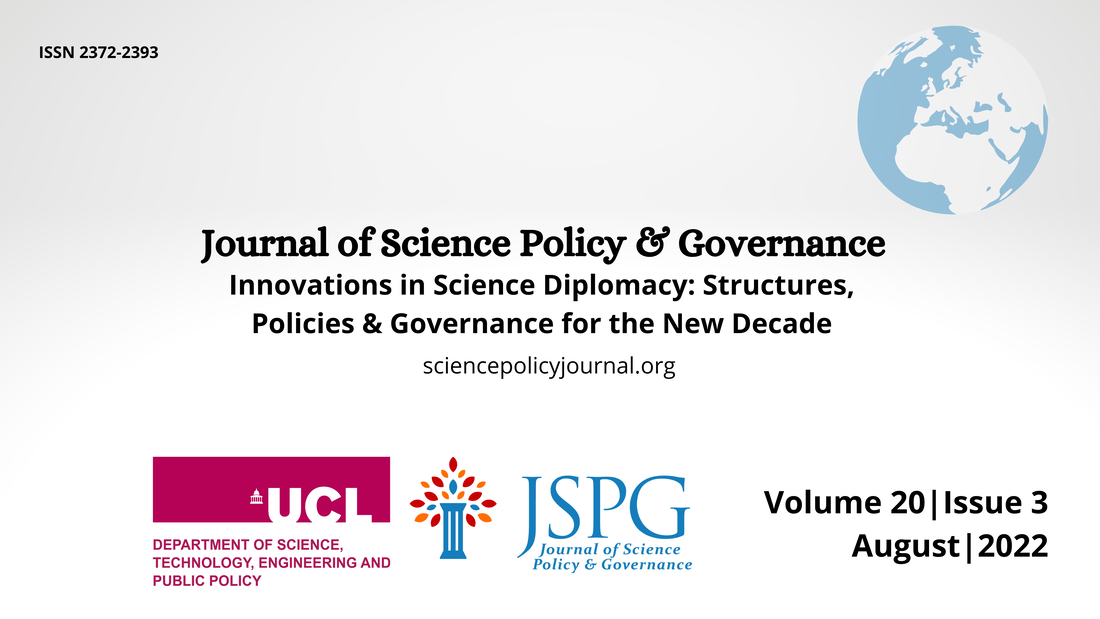
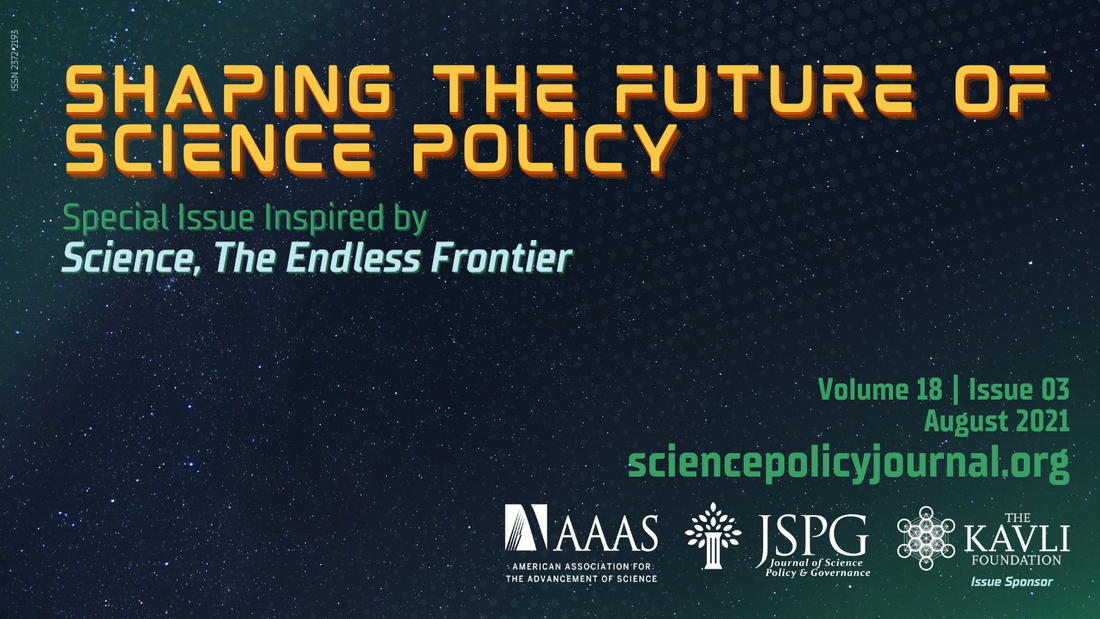
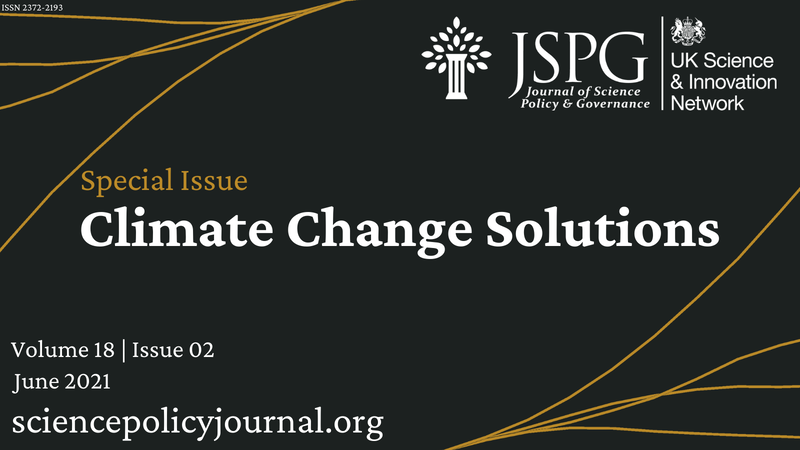
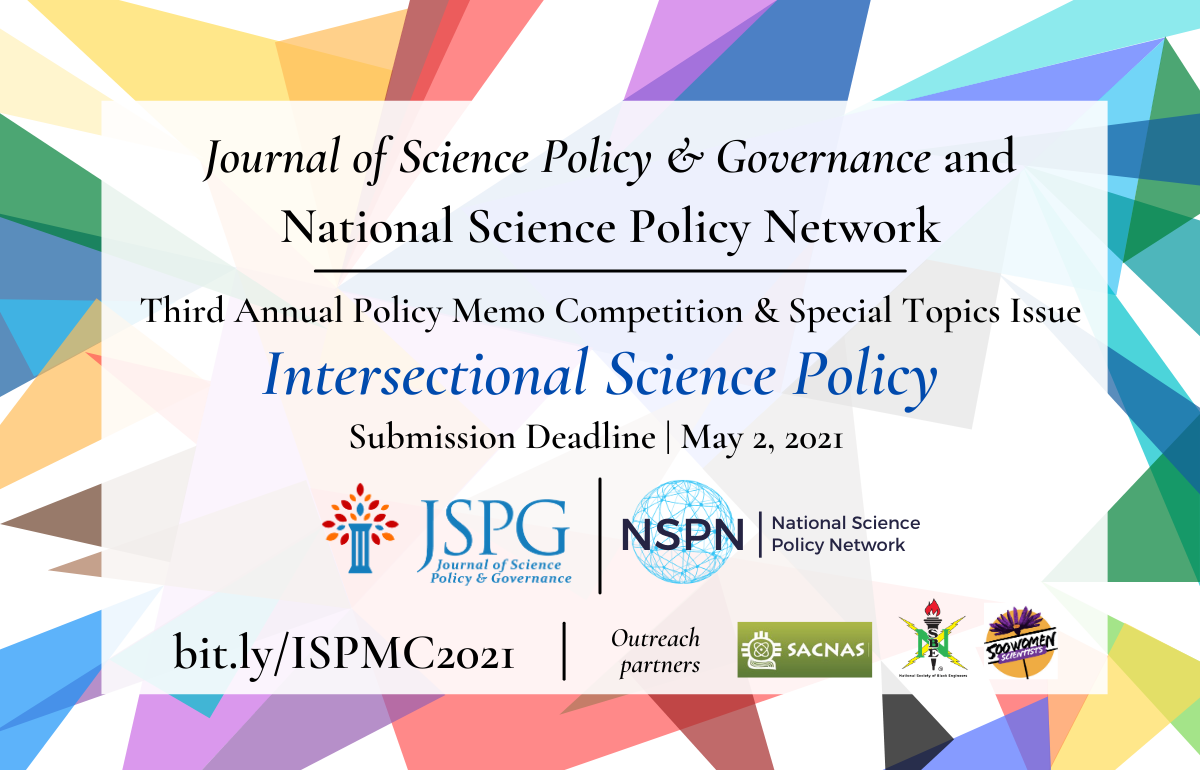





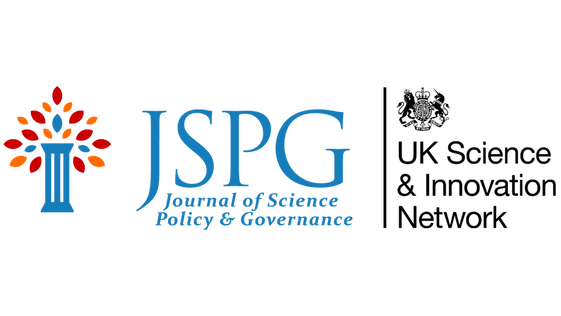
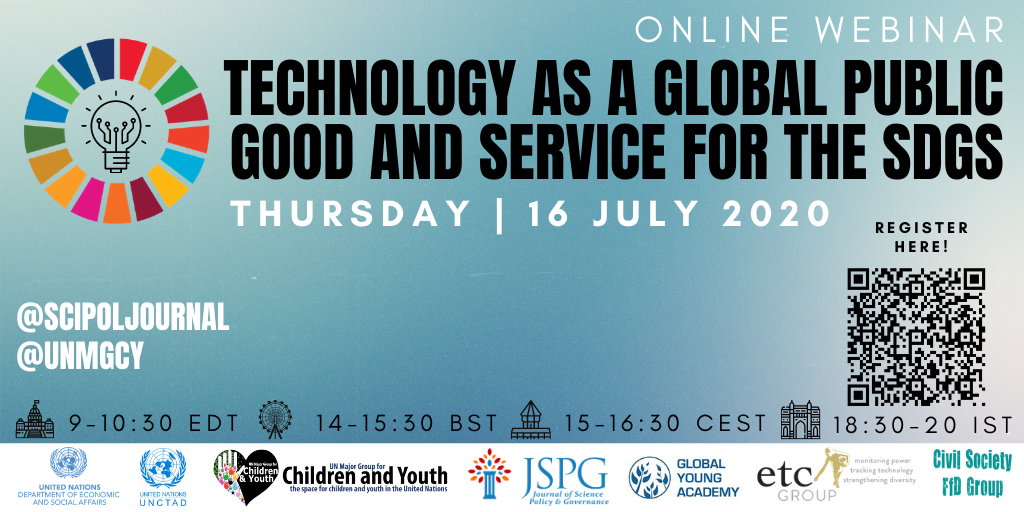
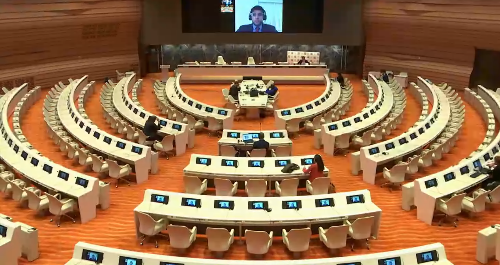
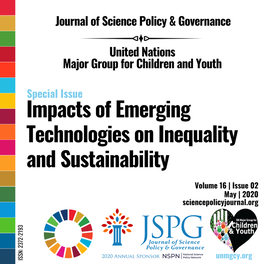
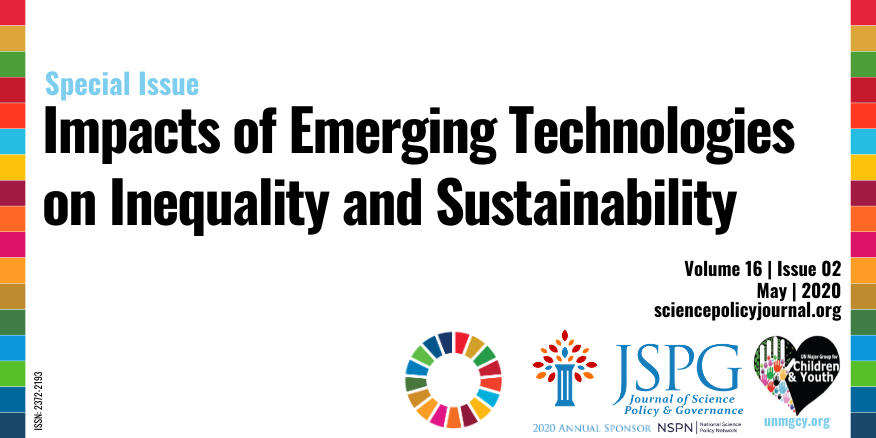
 RSS Feed
RSS Feed
